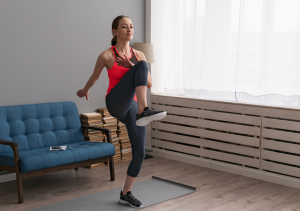If you’re looking for a way to get in shape, running is an excellent option. It’s one of the most popular forms of exercise. In fact, about 50 million Americans (or 15 percent of the US population) participate in some form of running or jogging, Statista Research Department reported in 2022. It’s also a great way to improve your health, increase your endurance, relieve stress, and even shed a few pounds. If you’re just getting started, you may feel overwhelmed. Don’t worry, it’s not as complicated as it seems. Simply, follow these helpful tips for beginners and you’ll be off and running in no time!
1. Choose the right running shoes.
Investing in a good pair of running shoes is essential for comfortable, injury-free running. Make sure you get a pair that fits your feet well and offers the right support and cushioning.

2. Set realistic goals.
It’s important to have a goal in mind when you start running, but make sure it’s something you can actually achieve. Don’t push yourself too hard or set expectations that are too high. Start with a goal that’s simple and attainable, like running a certain distance in a certain amount of time.

3. Start slowly.
Don’t try to run a marathon on your first day out. One of the most important running tips for beginners is to start with short, slow runs and gradually increase the distance and intensity of your workouts as you get stronger.

4. Warm up.
Warming up helps to prepare your body for exercise and reduce your risk of injury. Start by walking or jogging for a few minutes, then do some dynamic stretches. Dynamic stretches are active movements that help to prepare your muscles and joints for exercise. A few examples of dynamic stretches include walking lunges, high knees, butt kicks, and jumping jacks.

5. Cool down.
Cooling down helps your body to recover from exercise and reduce soreness. Walk or jog for a few minutes, then do some static stretches. Static stretching is a type of stretching that involves holding a position for a period of time. Be sure the static stretches include those for your calves, hamstrings, quadriceps, IT band, and hip flexor.

6. Use the proper running form.
Proper running form can help you run more efficiently, reduce your risk of injury, and improve your overall running experience. A few tips for running form include:
- Keep your head and shoulders relaxed.
- Engage your core.
- Land on your midfoot or forefoot.
- Strike the ground under your center of gravity.
- Take short quick steps.

7. Listen to your body.
If you’re feeling pain, stop running and rest. Don’t push yourself too hard, especially when you’re first starting out.

8. Stay hydrated.
Staying hydrated is essential for any workout. Make sure you drink plenty of water before, during, and after your runs.

9. Cross-train.
Cross-training is a great way to improve your overall fitness and reduce your risk of injury. In addition to running, try other activities such as swimming, biking, or yoga.

10. Find a running buddy.
If you’re serious about running, it can be helpful to find a friend, family member, or coworker who is already a runner or willing to start running with you. This will help you stay motivated and on track. Plus, it’s more fun to run with someone else.

11. Finally, don’t forget to have fun!
Running should be enjoyable, not a chore. If you’re not having fun, you’re less likely to stick with it. Find a running route that you enjoy and listen to your favorite music while you run. Set a goal, but don’t forget to enjoy the journey.

In Closing
Starting running doesn’t have to be complicated. With a little planning and preparation, you can start running and enjoy all the benefits it has to offer. Just remember the running tips for beginners above and you’ll be well on your way to becoming a successful runner in no time.
 Dr. Christopher Cook is a Board-Certified Orthopaedic Surgeon and Sports Medicine & Joint Replacement Specialist at Advanced Ortho and Spine. He provides a full spectrum of Joint Replacement, Sports Medicine, and Shoulder & Upper Extremity services. Contact us today for more information or to request an appointment.
Dr. Christopher Cook is a Board-Certified Orthopaedic Surgeon and Sports Medicine & Joint Replacement Specialist at Advanced Ortho and Spine. He provides a full spectrum of Joint Replacement, Sports Medicine, and Shoulder & Upper Extremity services. Contact us today for more information or to request an appointment.

James Eby, MD, is a board-certified physiatrist, who specializes in nonoperative spinal procedures at Advanced Ortho & Spine. He provides a full spectrum of Physical Medicine treatments. Contact us today for more information or to request an appointment.
 Dr. Tarek Elalayli is a board-certified orthopaedic spine surgeon, who specializes in treating a full range of spinal conditions. Contact us today for more information or to request an appointment.
Dr. Tarek Elalayli is a board-certified orthopaedic spine surgeon, who specializes in treating a full range of spinal conditions. Contact us today for more information or to request an appointment.
 Dr. Erik Maryniw is a Board-Certified Hand and Upper Extremity Orthopaedic Surgeon at Advanced Ortho and Spine. He provides a full spectrum of Orthopaedic care and Microvascular Surgery from the hand to the shoulder. Contact us today for more information or to request an appointment.
Dr. Erik Maryniw is a Board-Certified Hand and Upper Extremity Orthopaedic Surgeon at Advanced Ortho and Spine. He provides a full spectrum of Orthopaedic care and Microvascular Surgery from the hand to the shoulder. Contact us today for more information or to request an appointment.
 Mitul Patel, MD is a board-certified orthopaedic spine surgeon, who specializes in treating a full range of spinal conditions. Contact us today for more information or to request an appointment.
Mitul Patel, MD is a board-certified orthopaedic spine surgeon, who specializes in treating a full range of spinal conditions. Contact us today for more information or to request an appointment.
 Dr. Lee Swiderek is a Fellowship-Trained Orthopedic Surgeon & Joint Replacement Specialist at Advanced Ortho and Spine. He provides a full spectrum of Joint Replacement and Complex Hip and Knee Reconstruction services. Contact us today for more information or to request an appointment.
Dr. Lee Swiderek is a Fellowship-Trained Orthopedic Surgeon & Joint Replacement Specialist at Advanced Ortho and Spine. He provides a full spectrum of Joint Replacement and Complex Hip and Knee Reconstruction services. Contact us today for more information or to request an appointment.
 Dr. Daniel Hagaman is a Fellowship-Trained Orthopaedic Surgeon & Sports Medicine Specialist at Advanced Ortho and Spine. He specializes in a range of orthopaedic conditions and treatments including Knee Arthroscopy, Knee Ligament & Cartilage Repair, Shoulder Arthroscopy, Hip Arthroscopy, Orthobiologistics, and more. Contact us today for more information and to request an appointment.
Dr. Daniel Hagaman is a Fellowship-Trained Orthopaedic Surgeon & Sports Medicine Specialist at Advanced Ortho and Spine. He specializes in a range of orthopaedic conditions and treatments including Knee Arthroscopy, Knee Ligament & Cartilage Repair, Shoulder Arthroscopy, Hip Arthroscopy, Orthobiologistics, and more. Contact us today for more information and to request an appointment.

With two locations near Nashville in Mt. Juliet and Hermitage, Advanced Ortho and Spine provides patients with high-quality, personalized care while advancing orthopaedic excellence. Contact us today to learn more or to schedule your appointment.
Disclaimer: This blog provides general information and discussions about health and related subjects. The information and other content provided in this blog, or in any linked materials, are not intended and should not be construed as medical advice, nor is the information a substitute for professional medical expertise or treatment.If you or any other person has a medical concern, you should consult with your healthcare provider or seek other professional medical treatment. Never disregard professional medical advice or delay in seeking it because of something read on this blog or in any linked materials. If you think you may have a medical emergency, call your doctor or emergency services immediately.
The opinions and views expressed on this blog and website have no relation to those of any academic, hospital, health practice, or other institution.

